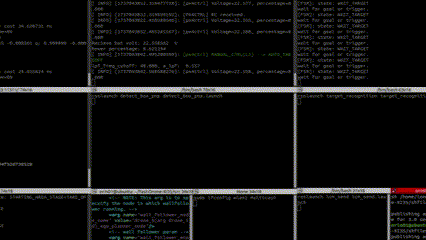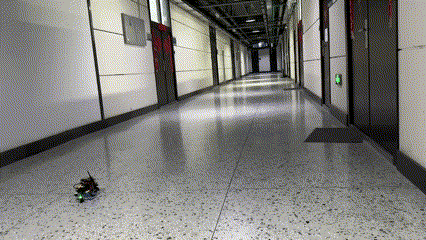Wall Follower
Result:


How to make a drone follow a wall while flying?
Pesudocode of finding next waypoint to follow the wall is shown as the flollwing.
\begin{algorithm}
\caption{Find\_next\_waypoint\_for\_wall\_following}
\begin{algorithmic}
\REQUIRE pts\_end $^{body}$ are initialzed
\ENSURE some postconditions
\INPUT pts\_end $^{body}$, $\vec{p} \in$ pts\_end $^{world}$, $T_{body}^w$
\OUTPUT next\_way\_point
\FUNCTION{Find-next-waypoint-for-wall-following}{pts\_end $^{body}$}
\IF{has\_reached\_waypoint}
\FOR{$\mathbf{each}$ pt\_end$^{body}$ $\in$ pts\_end$^{body}$}
\STATE pt\_end = $R_{body}^w \cdot$ pt\_end$^{body}$ $ + t_{body}^w$
\STATE raycaster.\CALL {Set-input}{body\_position/resolution, pt\_end/resolution}
\WHILE {raycaster. \CALL {step}{ray\_pt}}
\IF {\CALL {is-known-occupied}{ray\_pt}}
\STATE Occupied\_pts.\CALL{push-back}{ray\_pt}
\ENDIF
\ENDWHILE
\ENDFOR
\IF {Occupied\_pts.\CALL {Size}{} > certain\_threshold}
\COMMENT{Wall existing}
\STATE $\vec{p}, \vec{v}$ = \CALL{Plane-Fitting}{Occupied\_pts}
\STATE next\_way\_point = $\vec{p} +$ \CALL {Sign}{(body\_position - $\vec{p}$) $\cdot \vec{v}$} $\cdot d_w \frac{\vec{v}}{||\vec{v}||}$
\IF{\CALL {is-known-occupied}{next\_way\_point}}
\STATE next\_way\_point = \CALL {Ray-casting}{body\_position, next\_way\_point}
\STATE next\_way\_point = body\_position + k $\cdot$ (next\_way\_point - body\_position)
\COMMENT {0 < k < 1}
\ENDIF
\ELSE
\COMMENT {Wall absent}
\STATE next\_way\_point = \CALL{Move-right-forward}{$T_{body}^w$}
\ENDIF
\STATE Occupied\_pts.\CALL{clean}{}
\RETURN next\_way\_point
\ENDIF
\ENDFUNCTION
\end{algorithmic}
\end{algorithm}
\begin{algorithm}
\caption{Ray-casting}
\begin{algorithmic}
\FUNCTION{Ray-casting}{pt\_start, pt\_end}
\STATE to do
\ENDFUNCTION
\end{algorithmic}
\end{algorithm}
\begin{algorithm}
\caption{Plane-Fitting}
\begin{algorithmic}
\FUNCTION{Plane-Fitting}{pts}
\STATE to do
\ENDFUNCTION
\end{algorithmic}
\end{algorithm}
FOV points initialization
\begin{algorithm}
\caption{pts\_end\_body\_initialization}
\begin{algorithmic}
\FUNCTION {Pts-end-body-initialization}{f,deltaY,deltaZ,X}
width_idx = (int)std::ceil(f_/X_ * deltaY_)
\ENDFUNCTION
\end{algorithmic}
\end{algorithm}
In VINS-Fusion, in order to simplify the notation, author denotes the IMU as body's center (if the IMU isn't used, left camera is denoted as body's center).
NED (North-East-Down) convenstion is used as that of body frame in PX4, but NWU (North-West-Up) is denoted as body frame in VINS-Fusion and fast-drone-250.
In ego-planner (or fast-drone-250), planner node subscribes entrinsic topic and depthOdom synchronizer in order to compute the cam_r and cam_pos using entrinsic and odom (body frame) translation.
Modification in fast-drone source code
Wall follower class should be added in EGOPlannerManager class, rather than creating a new nodes, as GridMap::Ptr grid_map_ can only be observable in EGOPlannerManager class to be reused.
Three steps need to be done while adding a new package in the catkin workspace to develop a project
- create a new package, including writing
package.xml, Cmakelists.txt, *.cpp, *.hfiles. - Modify .cpp .h of the package which depend on the new one.
- add
#includeinto.hof the package using the new one - add initialization function of new package into
.cppof the package using the new one
- add
- Modify
package.xml Cmakelists.txtof the package using the new one
More details is shown as follow.
wall_follower.h and wall_follower.h under wall_follower dir
wall_follower.cpp:
- Move
ptsEndFovGeneration()from classWallFollowertoWallFollower::PtsEndFov, and modify corsponding varias name (e.g.X_toX = pts_end_fov_ptr->X_;) - add some param print
- Move
pts_end_fov_pub_from constructor ofWallFollowerto that ofWallFollower::PtsEndFov - fix a bug in the function
publicPtsEndFov()void WallFollower::PtsEndFov::publicPtsEndFov() ... { 327 for (auto& pt_end_world: pts_end_world) { 328 pt.x = pt_end_world(0); 329 pt.y = pt_end_world(1); 330 pt.z = pt_end_world(2); 331 + cloud.push_back(pt); 332 } ... } - fix the logic of projecting
pts_end_body_topts_end_world_by varify odom before using it.199 + if (grid_map_ptr_->md_.has_odom_) { ... 214 + for (auto& pt_end: pts_end) { 215 + pt_end = camera_r_m * pt_end + camera_pos; 216 + } ... 221 + pts_end_fov_ptr_->pts_end_world_ = pts_end; 222 + } - add
odom_sub_
wall_follower.h:
grid_map.h and grid_map.cpp under plan_env fir
All modification in this file is to make camera_pos_ and camera_r_m_ update and observable for projecting pts_end_body_ to pts_end_world_ in wall_follwer.cpp
grid_map.h:
- make
mp_andmd_public9 -private: 10 MappingParameters mp_; 11 MappingData md_; 12 13 + private: 14 +
grid_map.cpp:
add oritation update inThe reason why this change was reversed is that extrinsic of exp and sim are different. subscribingvoid GridMap::odomCallback(const nav_msgs::OdometryConstPtr &odom)grid_map/odomin wall_follower.cpp directly instead of usinggrid_map_ptr_->md.camera_pos_andgrid_map_ptr_->md.camera_r_m_22 @@ -735,6 +735,11 @@ void GridMap::odomCallback(const nav_msgs::OdometryConstPtr &odom) { 23 md_.camera_pos_(1) = odom->pose.pose.position.y; 24 md_.camera_pos_(2) = odom->pose.pose.position.z; 25 26 + md_.camera_r_m_ = Eigen::Quaterniond(odom->pose.pose.orientation.w, 27 + odom->pose.pose.orientation.x, 28 + odom->pose.pose.orientation.y, 29 + odom->pose.pose.orientation.z).toRotationMatrix(); 30 + 31 md_.has_odom_ = true; 32 }
ego_replan_fsm.h and ego_replan_fsm.cpp under plan_manage dir
package.xml and CmakeLists.txt under plan_manage dir
Reference
- Project 2: Robot Wall Following by Reinforcement Learning
- Chapter 9. Motion Planning in Simple Geometric Spaces
Debug log
Invalid use of non-static data member
Nested classes are not connected to any instance of the outer class.
My case:
class WallFollower {
struct PtsEndFov {
...
void publicPtsEndFov();
}
GridMap::Ptr grid_map_ptr_;
}
grid_map_ptr_ is used in void publicPtsEndFov(); leading to error “Invalid use of non-static data member”.
stackoverflow: invalid use of non-static data member
No matching function for call to ‘ros::NodeHandle::param’
nh.param("wall_follower/f", f_, 100);
It fails on builds with the following error:
error: No matching function for call to ‘ros::NodeHandle::param’
f_ is double type and 100 is int type. They are not matching.
The correction is shown as below:
nh.param("wall_follower/f", f_, 100.0);
Why catkin_make make nothing change after I edited the source code
Answer in ROS Answers:
I understand it as both your src folder contains files with the same names and same CMakeList but only some lines of code differs between the two. That being said when you run catkin_make after swapping your folders catkin doesn’t notice any change in your files (I don’t really know how, probably CMake related, but if someone can enlighten me on this part) so if nothing has changed catkin won’t rebuild everything as usual.
To avoid that you have two options :
- Delete the build and devel folder each time you change the src folder
- Change a little thing in a file so that catkin notice a change and rebuild the package
My problem has been solved following “Delete the build and devel folder each time you change the src folder”.
`WallFollower::~WallFollower()’ is defined multiple times
I wrote deconstruct function outside the class in .h file, which should be enclosed by class that it belong to.
static member function
class members should not be used in static member function, as there is no instance while using a static member function.
std::vector can’t be access the element whose index out of range
if there are not elements pushed back (i.e. vector is clear), any elements can’t be accessed using index.
If no occupied points, it shouldn’t use planeFitting()
rand()%occupied_pts.size(); //will be rand()%0, wrong!
Invalid argument passed to canTransform argument source_frame in tf2 frame_ids cannot be empty
%0 is no define
Just change the order of a variable
next_waypoint need to be initialized
void WallFollower::findWayPointCallback(const ros::TimerEvent& /*event*/)
{
if (have_odom_) {
if (!is_next_waypoint_initialized_) {
next_way_point_ = body_pos_;
is_next_waypoint_initialized_ = true;
}
// std::cout << "MY_DEBUG: dist = " << (body_pos_-next_way_point_).norm() << std::endl;
if ((body_pos_-next_way_point_).norm() < 0.5) {
findNextWayPoint();
}
}
}
fix most forward point in plane
/* get the point of most front in the best plane */
double max_temp = 0;
for (auto &pt: occupied_pts) {
double d = plane_fitter_ptr_->solveDistance(pt, last_best_plane);
if (d < plane_fitter_ptr_->sigma_) {
// double temp = body_pos_.normalization().transpose() * pt;
double x_local = (body_r_m_.transpose() * (pt - body_pos_))(0);
if (x_local > max_temp) {
max_temp = x_local;
last_best_plane.p_ = pt;
}
}
}